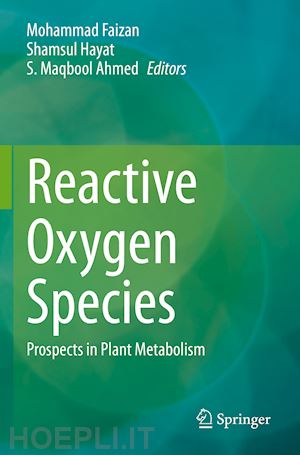
Questo prodotto usufruisce delle SPEDIZIONI GRATIS
selezionando l'opzione Corriere Veloce in fase di ordine.
Pagabile anche con Carta della cultura giovani e del merito, 18App Bonus Cultura e Carta del Docente
This edited book focuses on ROS synthesis, potential applications, toxicity, and preservations. It explores the recently proposed hormonal response and biomolecules targeted in regulation of ROS. Chapters cover resistance and susceptibility to plant pathogen, strategies involving phytoprotectants, and life span of nematode affected by ROS. This book includes a compilation of recently written, integrated, and illustrated reviews describing latest information on ROS. Chapters incorporate both theoretical and practical aspects of plant ROS.
Reactive oxygen species (ROS) are key signaling molecules involved in the redox equilibrium and biological processes. In plants, ROS play an important role in biotic and abiotic stress sensing, integration of diverse environmental signals, and commencement of stress-response networks, thus contributing to the establishment of defense mechanisms and plant resilience. Critical amount of ROS is required by plants for regular operation of vital physiological mechanisms.This book brings together a compilation of latest research work on reactive oxygen species and their emerging importance. The book is a useful read for students, researchers, and scientists in the field of agri-life sciences.
Dr. Mohammad Faizan is working as an assistant professor in the Botany Section at Maulana Azad National Urdu University, Hyderabad, India. He completed his postdoc in 2021 in the Department of Silviculture, College of Forestry, Nanjing Forestry University, Nanjing, China. In 2018, he received his PhD in botany from Aligarh Muslim University, Aligarh, India, and his MSc in 2014 from Chhatrapati Shahu Ji Maharaj University, Kanpur, India. His ongoing research is based on abiotic stress tolerance mediated by nanoparticles, and investigating the bioaccumulation, bio-transformations, uptake, translocation, and effects of bulk- and nano-forms of metals on plant physiology, morphology, anatomy, the ultrastructure of cellular and subcellular organelles, and modifications.
Dr. Shamsul Hayat is a professor in the Department of Botany, Aligarh Muslim University, Aligarh, India. He received his PhD in botany from Aligarh Muslim University, Aligarh, India. Before joining the Department of Botany at Aligarh Muslim University as faculty, he has worked as a research associate and young scientist in the same department. He has also worked as an associate professor at King Saud University, Riyadh, Saudi Arabia; as a BOYSCAST Fellow at the National Institute of Agrobiological Sciences, Tsukuba, Japan; and as a visiting scientist through INSA-bilateral exchange program in the Faculty of Biology and Chemistry, Institute of Biology, Department of Plant Biochemistry and Toxicology, University of Bialystok, Poland.
Dr. S. Maqbool Ahmed is presently working as Professor of Botany, Botany Section of School of Sciences, Maulana Azad National Urdu University, Hyderabad. He obtained his master’s and PhD degrees from Barkatullah University, Bhopal. He has teaching experience of 25 years, and before joining MANUU, he worked as a research fellow in the Regional College of Education (NCERT) Bhopal in one project sanctioned by CSIR-NEERI.











Il sito utilizza cookie ed altri strumenti di tracciamento che raccolgono informazioni dal dispositivo dell’utente. Oltre ai cookie tecnici ed analitici aggregati, strettamente necessari per il funzionamento di questo sito web, previo consenso dell’utente possono essere installati cookie di profilazione e marketing e cookie dei social media. Cliccando su “Accetto tutti i cookie” saranno attivate tutte le categorie di cookie. Per accettare solo deterninate categorie di cookie, cliccare invece su “Impostazioni cookie”. Chiudendo il banner o continuando a navigare saranno installati solo cookie tecnici. Per maggiori dettagli, consultare la Cookie Policy.